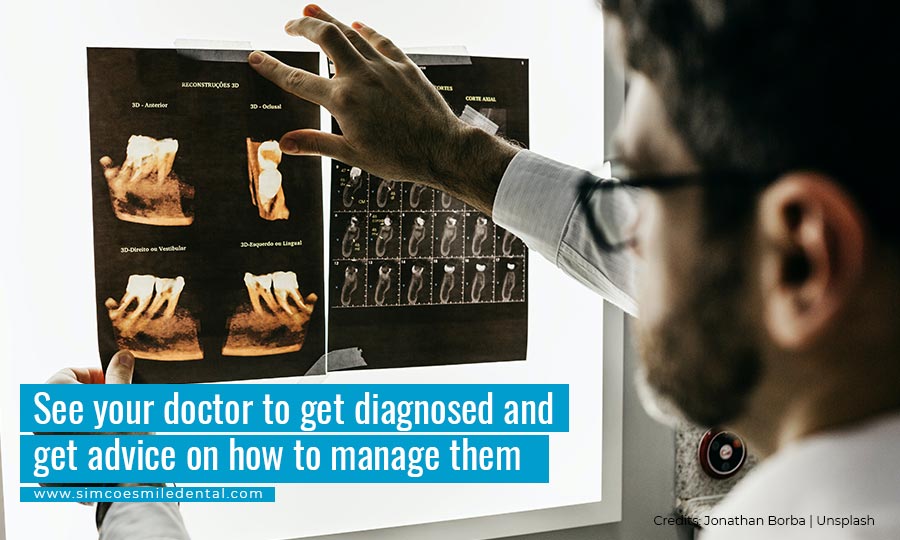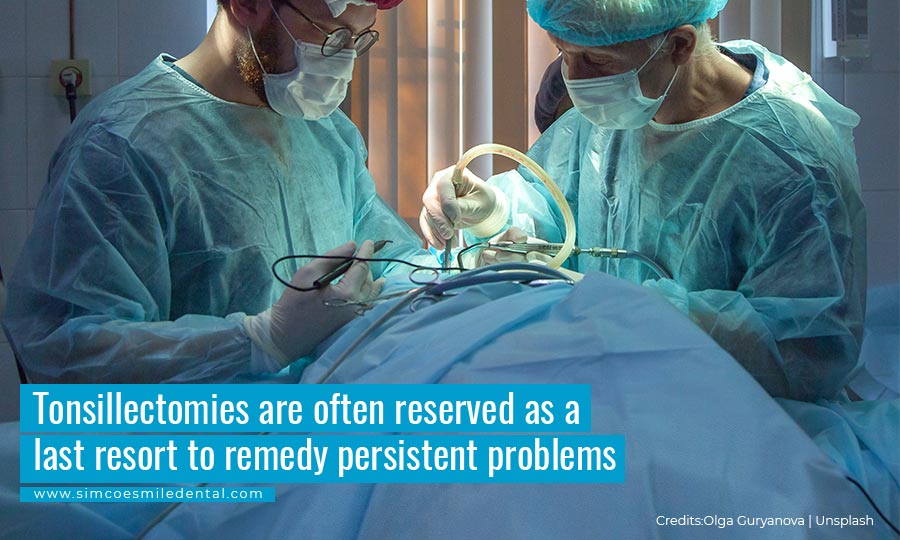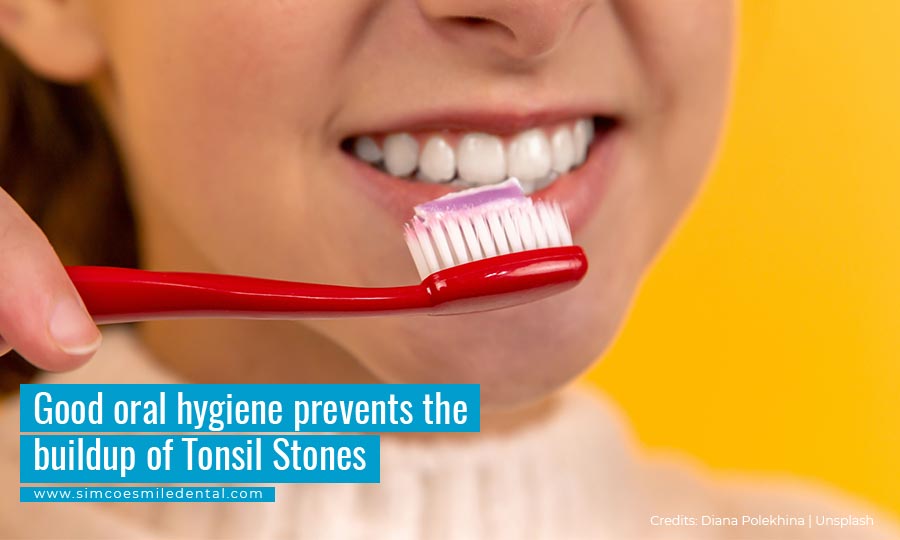Have you ever noticed white nodules that look like small stones at the back of your throat? These are called tonsil stones. Although tonsil stones may have a serious name, they are quite common. In fact, a number of people develop these but don’t even notice them at all.
On most occasions, they often don’t become a bother to those who develop them, while others have reported persistent cases that usually lead to debilitating effects. Fortunately, there are ways to manage them.
What Are the Tonsils and Why Are They Affected?
The tonsils are two small mounds of tissue that lie at the back of the throat, one on either side. They help fight infections that enter through the mouth. They trap bacteria, viruses, and other foreign invaders and then “teach” the immune system how to fight these germs.
Your tonsils aren’t smooth. There are folds around them to help protect them, and this is usually where the debris and small particulates collect. Overtime, these particulates calcify and attract bacteria which can most often cause the formation of tonsil stones.
What Are Tonsil Stones?
Tonsil stones, also known as tonsilloliths, are small lumps of hard material that form in your tonsils. They are often made up of debris caught in the small crevices of your throat and will most often have some bacteria in them as well.
Tonsil stones look like little white or yellow pebbles on your tonsils. You may have one tonsil stone or many. They’re usually small, though sometimes people can get large ones.
These tonsil stones form when debris usually from food gets lodged inside the small crevices in the back of your throat. Your immune system will sense the presence of foreign bodies and will send white blood cells to fight the infection. Oftentimes, these white blood cells can leave behind calcifications. These can also be caused by the natural shedding of dead cells and mucus which are normal bodily byproducts.
Over time these particles build up, they clump together, and consequently attract bacteria.
Because of the presence of bacteria, more often than not these tonsil stones will cause bad breath and other forms of oral health issues. Tonsil stones most often develop in people who have long term inflammation in their tonsils.
Sometimes these tonsilloliths may cause pain and irritation in the throat which are often mistakenly identified as a mild case of sore throat. If left unchecked these tonsilloliths can sometimes lead to more severe cases of oral health issues.
How Are Tonsil Stones Diagnosed?
Your doctor can usually diagnose tonsil stones via a physical exam. For more cases where they are hidden in the crevices and folds of your tonsils, imaging tests may be necessary such as a Magnetic Resonance Imaging (MRI) or a Computed Tomography Scan (CT SCAN).
They can also diagnose the causes of why there is a persistent build up of these tonsilloliths and help guide you on the steps to manage them.
What Are the Common Symptoms of Tonsil Stones?
Tonsil stones, just like many oral health issues, don’t happen overnight. These tonsilloliths are an accumulated byproduct of debris in your mouth. And just like all health issues, they will come with various symptoms.
Some of these symptoms can be caused by deeper underlying causes, which is why it is necessary to consult a doctor to rule out all possible health issues, not just the ones related to oral health.
- Bad Breath
The main sign of a tonsil stone is bad breath, or halitosis, that comes along with a tonsil infection.
The foul smelling breath is caused by the increased buildup of bacteria in the tonsils. One sign that the bad odour may be caused by tonsil stones is that it is persistent even with constant brushing.
- Sore Throat
Your tonsils are an integral part of your immune system. Due to it being located in your throat it is believed to be the one responsible for protecting you against infection coming from your mouth.
Since tonsil stones are home to bacteria, a common symptom is usually a sore throat or tonsillitis. This occurs when your tonsils are irritated by the bacteria and inflamed. If it’s due to a tonsil stone, tonsillitis may be persistent and recurring until the tonsillolith has been removed.
Sometimes, large tonsilloliths themselves can cause pain without having to irritate the throat or the tonsils.
- Persistent Coughing
Tonsilolliths, although hardened and solid, can chip away and cause irritation and itching in your throat. This can often cause coughing fits as it continues to happen. This may feel like dry coughs and may be persistent so long as the tonsillolith is still in place.
However, persistent cough may be a symptom of a deeper underlying condition, which is why it is important to consult a healthcare professional to help you determine the root cause.
- Trouble Swallowing
Depending on the size and location of the tonsil stone, this can sometimes cause trouble in swallowing.
The food particles or liquids may have trouble passing through to the esophagus or may dislodge a tonsil stone and cause pain when swallowing.
- Ear Pains
Tonsil stones can develop anywhere in your tonsils. Since your ear and throat share the same nerve cluster, you can sometimes feel pain in your ears even if the tonsil stones aren’t near them.
Tonsil Stone Complications
Tonsil stone problems are uncommon, although they can occur. A deep infection of the tonsil known as an abscess is one of the most serious problems that can occur as a result of tonsil stones.
Tonsil stones of a large size can harm and disturb normal tonsil tissue, resulting in swelling, inflammation, and infection. Tonsil stones caused by tonsil infections may need to be removed surgically.
Tonsil Stone Removal Procedures
Some tonsil stones are small enough to be washed away by water or mouthwash, while others may need a little more tending to.
There are videos on the internet where they manually reach in with their fingers and remove the tonsil stone from their throat. This is a very dangerous procedure and if not carefully done, can cause more harm than good. It is always best to consult a medical professional should you develop tonsilloliths.
Antibiotics may help with the tonsil swelling and the bacteria, however these cannot solve the main causes of the buildup. Some people will be more susceptible to tonsil stones as the nature and shape of their tonsils allow for the build-up and accumulation of debris.
Other patients with persistent chronic development of Tonsil stones would prefer to have their tonsils removed in a procedure called a tonsillectomy. Medical professionals will advise patients to get this procedure done if there is an incessant buildup of tonsil stones.
Though a tonsillectomy is a solution, this would often be a last resort as this is an invasive procedure.
A modern procedure to remove and prevent the build up of Tonsil stones is called a Cryptolisys. What this procedure does is it utilizes radio frequencies to create scar tissues in your tonsils that would then fill the gaps from the crevices. This consequently reduces the likelihood that debris and other particles can get trapped and eventually calcify.
At-home remedies to solving tonsil stones include gargling with salt water, though these will only be limited to small build ups.. This may help wash away tonsil stones and relieve pain from the swelling, however for more serious cases of tonsillolith buildup, this may not be very effective.
Manual removal of tonsil stones at home is not recommended, however, if you must try something, make sure to use a gentle water pick or a cotton swab as these objects combined with gentle pressure are less likely to result in long-term issues.
Tonsil Stone Prevention
Preventing the buildup and formation of the tonsilloliths is the best way to manage them.
The best way to do this is to develop a comprehensive oral hygiene practice or routine. Brushing your teeth and flossing can help remove unwanted debris from food in your mouth. Additionally, this will also help minimize the risk of bacteria build-up.
Gargling after eating can also prevent a build-up of particles as this can wash away debris. When it comes to choosing a mouthwash, there are two common types namely, antibacterial and antiseptic.
Antibacterial mouthwash is formulated to target bacteria while antiseptic Mouthwash can cover a wider array of microbes. If you’re unsure of what to buy, it would be best to consult your dental health expert as they can advise you on which one to get. Whether it’s persistent buildup of tonsil stones, bad breath, dry mouth, and more, they can recommend a particular mouthwash for your concerns.
Consult a Dental Health Care Professional
Although tonsil stones rarely result in serious complications, they can bring about a wide range of symptoms that can either be mild or in some cases debilitating.
If you have a persistent problem with the development of tonsil stones, or if you are concerned whether you have a build-up or not, consider talking to a medical professional. They can help guide you in managing your issues and prevent dental health problems.
If you’re looking for a trusted dental care facility, turn to Simcoe Smile Dental. We offer a variety of dental health services for you and your family and can help you manage your tonsil stones. Call us at 905-728-2321, to book an appointment.





